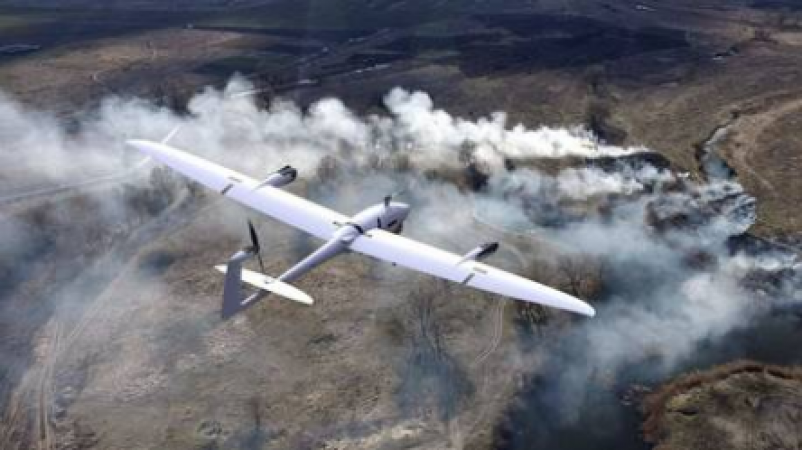
Berlin: German media outlets are awash with reports suggesting that a German-manufactured drone, specifically a PD-100 Black Hornet Nano, played a role in recent attacks on Russian positions in the Donbas region.
The PD-100 Black Hornet Nano is a compact, lightweight drone primarily designed for surveillance and reconnaissance. It is equipped with a camera and a thermal imaging sensor, boasting a flight duration of up to 25 minutes.
It is vital to underscore that the reports of this drone's involvement in attacks on Russia have not been officially confirmed by either the Ukrainian or German governments.
Also Read: Israel Extends US Visa-Waiver Program to Include Gaza Americans, Welcomed by Biden Administration
Nevertheless, if substantiated, this development would mark the first documented instance of a German-made drone being deployed in a combat scenario.
The use of the PD-100 Black Hornet Nano by Ukrainian forces carries profound implications for the ongoing conflict in Ukraine. Here, we explore the various dimensions and potential ramifications of this reported utilization.
The unverified reports of a German-made drone being employed in attacks on Russian positions underscore the evolving nature of modern warfare.
Drones, once primarily associated with surveillance and reconnaissance, have increasingly been used as tactical tools in conflicts around the world.
If these reports are indeed accurate, it represents a significant escalation in the tactics employed by Ukrainian forces in their struggle against Russian forces.
The PD-100 Black Hornet Nano's small size and advanced sensor capabilities make it an invaluable asset for surveillance and reconnaissance.
Also Read: Morocco Decides to Proceed with IMF after Earthquake
Its ability to gather real-time intelligence, coupled with its thermal imaging sensor, enhances its utility in identifying targets, monitoring enemy movements, and assessing battlefield conditions.
The use of the PD-100 Black Hornet Nano potentially offers Ukrainian forces a considerable advantage over Russian counterparts. With effective deployment, this drone can disrupt enemy operations, providing vital information to Ukrainian commanders.
This newfound capability might impact the balance of power on the ground, potentially leading to a protracted conflict or even influencing the outcome of the conflict itself.
Germany has historically maintained a stringent policy against exporting arms to countries involved in active conflicts. If confirmed, the alleged use of a German-made drone in Ukraine could prompt a reevaluation of this policy.
It may necessitate a broader discussion within the German government regarding the responsible export of defense technology and the potential risks and benefits associated with such exports.
The purported deployment of a German-made drone in the conflict underscores the intricacies and geopolitical challenges associated with the ongoing crisis in Ukraine.
The situation is far from straightforward, and it defies easy solutions. The potential involvement of German technology in the conflict adds another layer of complexity to an already delicate and multifaceted issue.
The use of drones in conflict zones is not a new phenomenon, but it is continually evolving. The introduction of advanced drone technology into the Ukrainian conflict could signal an escalation in the tactics employed by both sides. This escalation, in turn, raises the risk of further instability in the region and the potential for a prolonged conflict.
The ongoing deployment and effective use of the PD-100 Black Hornet Nano by Ukrainian forces could potentially lead to a strategic stalemate in the conflict or even provide Ukraine with a tactical advantage.
This outcome would depend on numerous factors, including the extent of Ukrainian proficiency in deploying and utilizing the drone effectively.
The reported involvement of the PD-100 Black Hornet Nano serves as a stark reminder of the intricacies and challenges associated with the Ukrainian conflict. It is a multifaceted conflict with no simple solutions. The role of advanced technology, like drones, adds another layer to an already volatile and unpredictable situation.
Also Read: Historic Deal: $6 Billion Transfer Paves Way for Release of Detainees
The alleged use of a German-made drone in attacks on Russia also has broader international implications. It could potentially draw attention and concern from other nations and international organizations, adding to the complexity of the conflict.
As reports continue to emerge and the situation develops, the reported involvement of a German-made drone in attacks on Russia underscores the evolving nature of modern warfare and the complexities of the Ukrainian conflict.
It prompts questions about policy, technology exports, and the potential impact on the balance of power in the region. The conflict in Ukraine remains a highly fluid and unpredictable situation, with significant implications for regional stability and international relations.